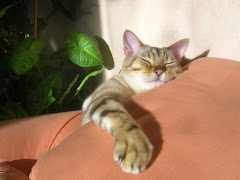 Would you like a New Year gift?
Would you like a New Year gift? I can think of nothing better to offer you than the heart-warming, short video I received at Christmas.
But, before sharing the link, let me explain why its message is so relevant at the present time . . . and why you should watch it.
Last November, an article entitled: 'Twenty-two animals that are in danger of disappearing forever' appeared in the 'Insider' magazine.
Taking into account the vast number of species that we've already lost, it made sobering reading. In addition to providing details of the creatures on its list, the article offered convincing explanations as to why this calamity is predictable.
 You won't be surprised to learn that we humans are largely to blame. Conveniently forgetting the fact that we share ninety-nine per cent of our DNA with chimpanzees, we would appear to suffer from the delusion that we are infinitely more important than every other living species on the planet.
You won't be surprised to learn that we humans are largely to blame. Conveniently forgetting the fact that we share ninety-nine per cent of our DNA with chimpanzees, we would appear to suffer from the delusion that we are infinitely more important than every other living species on the planet.Over recent years, for reasons that include population explosion, climate change and sheer greed, we have invaded and destroyed countless previously untouched habitats. In so doing, we have thoughtlessly laid waste to the homes and sustenance of the birds, mammals, fish, insects and plants that lived there.
Do you see this Malayan tiger cub?
Threatened by road development and logging operations, there are now less than three hundred of these superb creatures left in the world.
And, tell me, when did you last see a hedgehog . . . or hear a cuckoo?
What we under-estimate to our cost is not only the right to life of every species, but also the unique importance, beauty and intelligence of each of our fellow creatures . . . qualities that permeate the animal kingdom from the smallest fish to the largest mammal.
But could we be coming to our senses?
I'm delighted to say that there's some good news to start the New Year.
 In 1972 the Arabian oryx was declared 'extinct in the wild'. In 1982 a small herd was taken from a zoo and re-introduced into the Arabian desert where it has now established itself. No longer officially 'extinct', the Arabian oryx was last year classified as 'vulnerable'.
In 1972 the Arabian oryx was declared 'extinct in the wild'. In 1982 a small herd was taken from a zoo and re-introduced into the Arabian desert where it has now established itself. No longer officially 'extinct', the Arabian oryx was last year classified as 'vulnerable'.In a similar instance, the efforts to reintroduce the Asian zebra, known as the kulan, to central Kazakhstan, are proving equally successful.
 And there's more good news . . . in a rather unlikely collaboration, nuns at a convent in Mexico are currently working on a joint conservation project with Chester Zoo.
And there's more good news . . . in a rather unlikely collaboration, nuns at a convent in Mexico are currently working on a joint conservation project with Chester Zoo.Their mutual aim is to rescue the fabled axoloti, a Mexican salamander, from the polluted waters of the local lake and thereby save it from extinction. Under the guidance of the zoo, the nuns have saved the remaining salamander and, as you can see in this photo, are now breeding them successfully in the convent.
 Nor is that all . . . there's good reason to celebrate in Madagascar. The rarest bird in the world, once thought to be extinct, is a species of duck called the Madagascar pochard.
Nor is that all . . . there's good reason to celebrate in Madagascar. The rarest bird in the world, once thought to be extinct, is a species of duck called the Madagascar pochard.After being successfully reared at The Slimbridge Wetlands Centre in Gloucestershire, the last twenty-five of the species were taken to their home country in time for the New Year, and are now happily re-established on Lake Sofia.

All of which brings me to the New Year gift I promised you.
As I've told you before, my cat, Chloe, 'works' as a therapy cat for the Pets As Therapy charity.
Whilst visiting the nursing home, her capricious and exuberant nature is transformed. On arrival she becomes compliant and caring . . . recognising and responding to the needs of each patient she visits.
Empathy, care, sensitivity, intuition . . . characteristics that the animal kingdom possesses in abundance.
You'd like proof? Then it's time to open your gift.
Click here . . . and may it be a happy, non-threatening New Year for all life on Earth.
